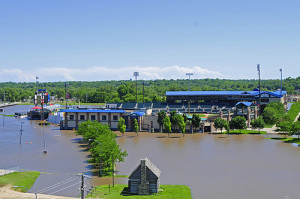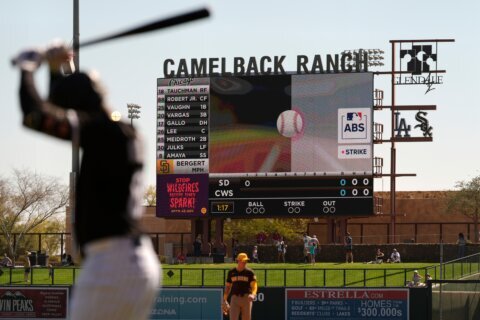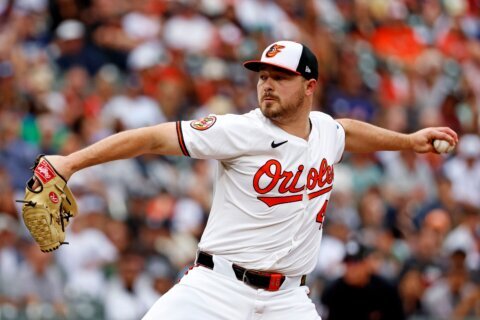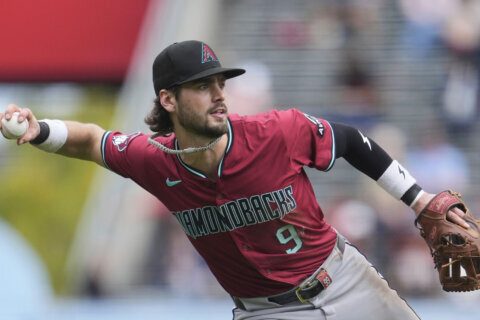WASHINGTON — On July 23, 1967, the New York Yankees played a doubleheader in Detroit, the same day that the 12th Street riot broke out across town in the Virginia Park neighborhood. As the Sporting News reported on Tuesday, Tigers outfielder Willie Horton finished the second game, a Tigers win in which he homered, got in his car in full uniform, and drove to the erupting neighborhood against the team’s wishes.
The Tigers were lucky — Horton wasn’t hurt amid the violence, which killed 43 people over four days. The team, meanwhile, rescheduled their upcoming series, due to start the next day, to the opponents’ home city. That city was Baltimore, the team the Orioles.
Forty-eight years later, the Orioles have found themselves in a precarious position due to the unrest that has taken place in the Charm City this week. After postponing both Monday and Tuesday night’s games, the organization made the decision to move their weekend series with the Tampa Bay Rays to Florida.
But their decision of what to do with Wednesday’s scheduled night game was far more interesting, and more rare — move the start time up to 2:05 p.m., and play without any fans in the ballpark.
Games have been moved before, mostly due to weather. On Sept. 14, 2008, Chicago Cubs pitcher Carlos Zambrano turned in a performance for the record books in more ways than one. He twirled a no-hitter against the Houston Astros … at Miller Park in Milwaukee, Wisconsin. The series, originally scheduled for Houston, was moved out of Texas due to Hurricane Ike.
The New Orleans Saints relocated their entire 2005 season following Hurricane Katrina, playing four games at LSU’s Tiger Stadium, three at the Alamodome in San Antonio, and one “home game” against the New York Giants at The Meadowlands in New Jersey.
As recently as last year, international soccer matches have been canceled due to political unrest. The U.S. Men’s National Team scrapped an international friendly in Ukraine scheduled for March of 2014, moving it to a safer location in Cyprus.
But since the social movements of the 1960s, there do not appear to be any such incidents on record in the United States. Pat O’Connor, president of Minor League Baseball, said he can’t remember any such event in the past 40 years in the minor leagues caused by any disturbance.
In order to find other cases of domestic social disputes interfering with professional sports, you have to go back to 1934. A longshoreman strike in San Francisco prevented spectators from getting to Seals Stadium to see the San Francisco Seals play. According to Pacific Coast League historian Dick Beverage, the Seals averaged fewer than 100 fans for much of the season, meaning hardly anyone saw a 19-year-old Joe DiMaggio hit .341 and swat a dozen home runs that season.
That’s still better than the Oakland Oaks-Portland Beavers matchup at Idora Park on Nov. 8, 1905, back in the age of 200-game seasons. There was a particularly big game across the bay in San Francisco that evening, and notably bad weather, at least by Bay Area standards. According to the record books, one lone fan reportedly attended that affair.

There has even been a single minor league game played in front of no fans. After floods hit the Midwest in the summer of 2008, the Iowa Cubs found the grounds surrounding Principal Park underwater, but the field itself miraculously still playable. Not wanting to miss too many games, they played their June 14 contest against the Nashville Sounds in front of nobody but the essential paid employees, drawing an official attendance of zero.
But to play a game, amid the unrest, with no spectators present, may be a first in Major League Baseball. It will set the new low record for attendance in the history of the sport, breaking the 133-year-old record of six, set by the Worcester Ruby Legs.
Certainly in Wednesday’s game, with both the Orioles and White Sox harboring at least ideas of the postseason, every game matters. The economic benefit that comes from making the playoffs outweighs the lost draw from one day of gate receipts. But it still seems odd, to say the least, to play without a crowd.
“I can’t pull to mind,” said PCL President Branch Rickey of any other time he’s seen such a thing in his baseball career, other than the Iowa incident.
“It’s hard to imagine a scenario in which a game would be played in which fans would not be able to participate.”
That scenario was something the Orioles could have had by moving the game down the road 40 miles to Nationals Park. But evidently, that was never an option. A spokesman for the Nationals confirmed that the club was never contacted about the possibility of playing the games in Washington. That perhaps should not be surprising, given that the two franchises have had plenty of publicly spilt bad blood over the money that each generates from their shared regional sports network, MASN.
So the Orioles will play a game for nobody Wednesday, the first of its kind in Major League history. It will be a sight to behold, only no fans will be there to do so.







